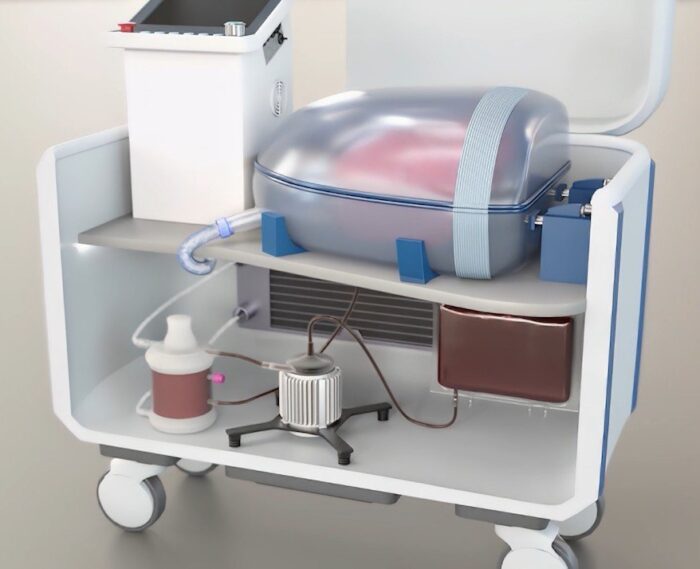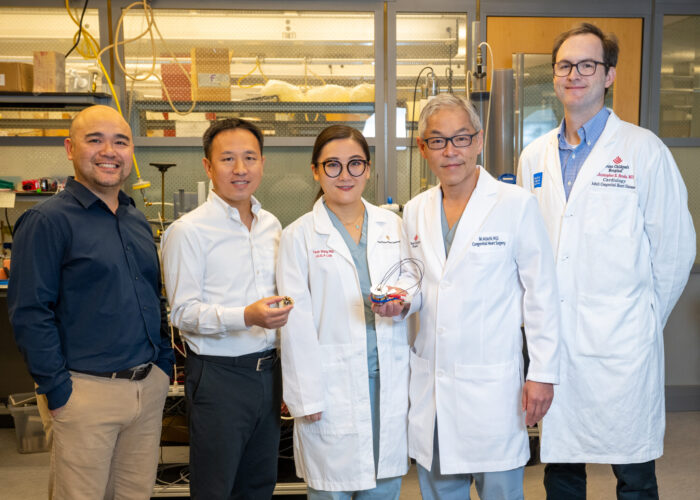Home > Cardiovascular Research > Innovative Device & Engineering Applications (IDEA) Lab
Innovative Device & Engineering Applications (IDEA) Lab
At the IDEA Lab, we’re redefining what’s possible in cardiovascular device innovation, especially for our smallest patients. By bringing together engineering rigor and clinical insight, we’re designing next-generation implants to support tiny hearts and give children with heart failure a true chance to grow.
The Innovative Device & Engineering Applications (IDEA) Lab at The Texas Heart Institute is where creativity meets clinical purpose. We specialize in the design, evaluation, and optimization of minimally invasive cardiovascular devices—from pediatric left ventricular assist systems to advanced training and simulation models. Working hand-in-hand with collaborators in the U.S., Japan, and the U.K., our team is focused on tackling unmet clinical needs—particularly among the youngest and most vulnerable patients.
Currently, our flagship project is the NeoVAD, a magnetic-levitation, fully implantable LVAD designed for neonates and children with heart failure. Supported by a multi-year NIH R01 grant, our goal is to deliver the first adaptable VAD sized for infants—offering lifesaving support while awaiting transplant. Simultaneously, we’re developing MicroVasc, a catheter-deployed intra-atrial blood pump engineered to unload the failing left ventricle and potentially promote cardiac reconditioning. Through these ambitious initiatives, the IDEA Lab is shaping a future where even the tiniest hearts have hope.
The THI Innovative Device & Engineering Applications lab is where creativity meets innovation. As seen here on Episode 8 of the Heart Beat, the team is creating new ideas, imaginations and possibilities to transform heart health and introduce new and effective solutions into the healthcare market.

Along with a multidisciplinary team the Innovative Device & Engineering Applications (IDEA) Lab have developed a groundbreaking new system that could transform the way lungs are preserved and transported for transplant. The ex vivo lung perfusion (EVLP), a method that keeps donor lungs functioning outside the body by circulating fluids and gases through them, simulating real-life conditions.
The new system takes EVLP a step further. Unlike traditional methods that offer limited support and transport time, this platform uses enhanced circulation, ventilation, and incubation features to mimic the human body more accurately. That means better preservation, more time to transport the organ safely across greater distances, and even the possibility to treat and improve lungs while they are en route.

The IDEA Lab is closer to realizing their hopes of a new device that will change and even save lives of countless children with congenital heart disease. The team was selected as one of 14 recipients for funding through the 2024 Single Ventricle Research Fund (SVRF) in response to their groundbreaking proposal, a novel implantable device called “ReVolution.”
This advanced pump is specifically designed for infants with congenital heart disease who have undergone the Fontan procedure. Unlike traditional approaches that merely support the failing Fontan circulation, the ReVolution pump establishes a “biventricular” circulation, making it adaptable to a variety of different anatomies.
Yaxin Wang, PhD, Associate Investigator and Director, Innovative Device & Engineering Applications (IDEA)
Dr Wang is the John S. Dunn Endowed Chair in Innovative Device & Engineering Applications (IDEA). This historic appointment recognizes Dr. Wang’s remarkable contributions to cardiovascular research and solidifies her leadership of the IDEA Lab, formed to pioneer alternatives to heart transplantation, has expanded its focus beyond left ventricular assist devices (LVADs) to innovative projects like Pediatric LVADs, Fontan Assist Devices, and Ex-Vivo Lung Perfusion Systems. Dr. Wang’s appointment marks a milestone as the first woman at THI to hold an endowed chair, reflecting THI’s commitment to diversity and excellence in research.
You can see how this popup was set up in our step-by-step guide: https://wppopupmaker.com/guides/auto-opening-announcement-popups/

Visit U.S. News & World Report